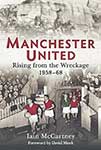 1958-68
1958-68
by Iain McCartney
Amberley Books, £25
Reviewed by Jonathan O’Brien
From WSC 320 October 2013
Whatever the other flaws of Manchester United: Rising from the wreckage 1958-68, you can’t accuse Iain McCartney of not putting in the hard yards. Don’t be fooled by the fact that it’s 350 pages in length: that figure could easily have been considerably higher, had the typesetter been only slightly more generous with the font size and spacing.
Books on the Munich disaster aren’t hard to come by. McCartney himself already has one to his credit, a well-reviewed biography of Roger Byrne, the United captain who died in the crash with 22 other people. This one is clearly his final word on the subject. Each page is crammed full of microscopic detail, from George Best’s car windscreen being defaced with lipstick by a lovelorn female fan, to the price of touted tickets for the Cup final, to assistant manager Jimmy Murphy’s preferred at-home listening (Chopin and Grieg).
McCartney must effectively have lived in the cuttings library for months to amass this much material. In its own way, the deluge of information reaches critical mass – and it’s not helped by the lack of subheadings to break up the text, meaning that the whole thing feels like a slog at times.
We all already know the narrative: the emotional aftershock of the crash, the slow rebuilding, the many painful defeats, the shaping of talented young players into gods of the game, the regaining of the title in 1965, won again two years later, the coronation against Benfica in 1968. McCartney uses the 1963 FA Cup final, in which United beat Leicester 3-1, as the turning point. The team narrowly avoided relegation that same month, finishing 19th, with many players still not psychologically recovered from Munich, dressing-room recriminations abounding (Noel Cantwell reputedly led the player-power faction) and Jack Crompton’s coaching methods being soundly criticised. It’s a reminder of how easily everything could have turned out differently.
With so much information crammed in, the prose tends towards the dryly matter-of-fact. Perhaps unavoidably, it settles into a laundry-list of match after match and win after win (though it never resorts to the Lego-brick approach of David Peace’s scarcely readable Red Or Dead). At times, it reads as if it were written in the late 1950s themselves. Perhaps this is McCartney’s way of getting into the spirit of the thing, eschewing the pseudy floweriness of so much current football writing for a just-the-facts approach that better suits the subject matter. Or perhaps that’s just the way he writes: not having read the Byrne book, it’s difficult to tell.
Despite its occasional drabness, it’s not hard to imagine Manchester United: Rising from the wreckage 1958-68 becoming the set text on the subject matter. If nothing else, it’s a remarkable feat of research and hugely admirable as an important contribution to the historical record – even if it’s not always easy to love as a piece of writing.